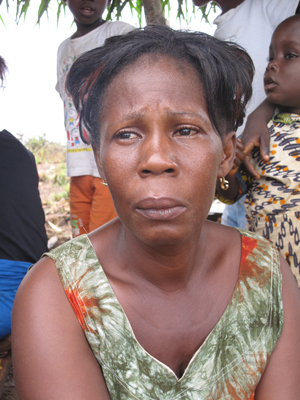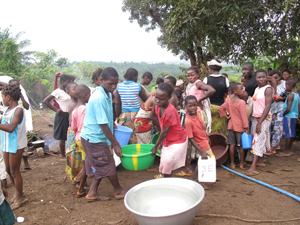 Mother of three, Louise Blagnon, sits with her extended family in the open air of the grounds of an abandoned school in the south-eastern Liberian coastal city of Harper. The sun beats down on us as we talk; and the only shelter is provided by some leaves which form a makeshift roof on the hastily-erected wooden structure that the family now sits and sleeps under.
Mother of three, Louise Blagnon, sits with her extended family in the open air of the grounds of an abandoned school in the south-eastern Liberian coastal city of Harper. The sun beats down on us as we talk; and the only shelter is provided by some leaves which form a makeshift roof on the hastily-erected wooden structure that the family now sits and sleeps under.
Louise's face is etched with anxiety. She's clearly traumatized by the events of the past week -- which saw her husband, Jean Toto Blagnon, an agricultural expert, beaten to death with sticks and the family forced to flee their home in Tabou city, in the Ivory Coast, and seek sanctuary in neighboring Liberia.
"The war made us flee. I was running with my husband and children, but they caught my husband. The rebels caught him and killed him," she told me.
"We went from village to village. Then we crossed the river and they brought us here. They killed my husband and I came here with all my family. Now, we have nothing. We have lost everything."
Like many new arrivals in Harper -- which saw an influx of more than 9,000 refugees in the space of just a few days last week -- Louise tells a story of her village coming under attack and many deaths. Now, frightened and without any possessions, she is seeking shelter and help in Liberia, which is housing more than 100,000 refugees. "Now, we have no food, there is nothing to eat; we have no mattresses; we have to sleep outside here and it rained on us", she said. She worries about the future -- especially for her children.
There are more than 4,600 refugees staying at the transit site in Harper. Its estimated that more than 4,000 others are staying near the border in Liberian villages, where local communities have been providing some food and shelter.
Most walked several days before arriving in Liberia, having fled for their lives. Oxfam has been helping to provide some of their basic necessities: clean water, washing facilities, toilets; as well distributing hygiene items such as buckets and jerry cans. The site, designed for just 1,500, is overcrowded. Not everyone can sleep in a tent; many, like Louise and her family, sleep outside; other families have occupied bare rooms in the derelict school, sleeping on the floor.
Most refugees here have experienced and seen violence -- some of it extreme. They speak of villages being burnt; looting and fighting.
Whatever the political developments of the past few days, none I spoke to were ready to return home any time soon, such was their fear of further retributions and revenge attacks.
Driver, Katchi Remi Moulehi, a 47 year-old father of four, is among them. His house was burnt down and two of his brothers were brutally killed with knives. He said he has "no reason" to return.
"There is no security and I have no confidence that it's safe to go back", he said. "I don't think I can go back to the Ivory Coast because of what happened."
Gnepadé Se, a mother of five, lost her youngest daughter, seven year-old Hie Gnabe, and her husband, Koutie Se, who worked on a rubber plantation, as her village came under attack.
"The rebels entered our village. My husband wasn't involved in politics. We don't get involved in politics. I don't understand why my husband is dead."
Gnepadé Se and her family sleep on the floor with hundreds of others in the abandoned school building. She looks dazed and exhausted. "My spirits are all mixed up; my soul is disturbed. I don't know why my husband is dead and why my child died.
"I'm in Liberia now. I'm in the hands of those who can help me. I have nothing. I am a poor woman. I have nothing."
Aid agencies are doing what they can. But funding to tackle the emergency is still woefully inadequate. The UN emergency appeal for Liberia is only just over a quarter-funded. The humanitarian crisis is far from over. It will take months, possibly even years, before those displaced by the violence in the Ivory Coast and Liberians, who are hosting them, can start to lead normal lives again. 
Our 2024 Coverage Needs You
It's Another Trump-Biden Showdown — And We Need Your Help
The Future Of Democracy Is At Stake
Our 2024 Coverage Needs You
Your Loyalty Means The World To Us
As Americans head to the polls in 2024, the very future of our country is at stake. At HuffPost, we believe that a free press is critical to creating well-informed voters. That's why our journalism is free for everyone, even though other newsrooms retreat behind expensive paywalls.
Our journalists will continue to cover the twists and turns during this historic presidential election. With your help, we'll bring you hard-hitting investigations, well-researched analysis and timely takes you can't find elsewhere. Reporting in this current political climate is a responsibility we do not take lightly, and we thank you for your support.
Contribute as little as $2 to keep our news free for all.
Can't afford to donate? Support HuffPost by creating a free account and log in while you read.
The 2024 election is heating up, and women's rights, health care, voting rights, and the very future of democracy are all at stake. Donald Trump will face Joe Biden in the most consequential vote of our time. And HuffPost will be there, covering every twist and turn. America's future hangs in the balance. Would you consider contributing to support our journalism and keep it free for all during this critical season?
HuffPost believes news should be accessible to everyone, regardless of their ability to pay for it. We rely on readers like you to help fund our work. Any contribution you can make — even as little as $2 — goes directly toward supporting the impactful journalism that we will continue to produce this year. Thank you for being part of our story.
Can't afford to donate? Support HuffPost by creating a free account and log in while you read.
It's official: Donald Trump will face Joe Biden this fall in the presidential election. As we face the most consequential presidential election of our time, HuffPost is committed to bringing you up-to-date, accurate news about the 2024 race. While other outlets have retreated behind paywalls, you can trust our news will stay free.
But we can't do it without your help. Reader funding is one of the key ways we support our newsroom. Would you consider making a donation to help fund our news during this critical time? Your contributions are vital to supporting a free press.
Contribute as little as $2 to keep our journalism free and accessible to all.
Can't afford to donate? Support HuffPost by creating a free account and log in while you read.
As Americans head to the polls in 2024, the very future of our country is at stake. At HuffPost, we believe that a free press is critical to creating well-informed voters. That's why our journalism is free for everyone, even though other newsrooms retreat behind expensive paywalls.
Our journalists will continue to cover the twists and turns during this historic presidential election. With your help, we'll bring you hard-hitting investigations, well-researched analysis and timely takes you can't find elsewhere. Reporting in this current political climate is a responsibility we do not take lightly, and we thank you for your support.
Contribute as little as $2 to keep our news free for all.
Can't afford to donate? Support HuffPost by creating a free account and log in while you read.
Dear HuffPost Reader
Thank you for your past contribution to HuffPost. We are sincerely grateful for readers like you who help us ensure that we can keep our journalism free for everyone.
The stakes are high this year, and our 2024 coverage could use continued support. Would you consider becoming a regular HuffPost contributor?
Dear HuffPost Reader
Thank you for your past contribution to HuffPost. We are sincerely grateful for readers like you who help us ensure that we can keep our journalism free for everyone.
The stakes are high this year, and our 2024 coverage could use continued support. If circumstances have changed since you last contributed, we hope you'll consider contributing to HuffPost once more.
Already contributed? Log in to hide these messages.

 Mother of three, Louise Blagnon, sits with her extended family in the open air of the grounds of an abandoned school in the south-eastern Liberian coastal city of Harper. The sun beats down on us as we talk; and the only shelter is provided by some leaves which form a makeshift roof on the hastily-erected wooden structure that the family now sits and sleeps under.
Mother of three, Louise Blagnon, sits with her extended family in the open air of the grounds of an abandoned school in the south-eastern Liberian coastal city of Harper. The sun beats down on us as we talk; and the only shelter is provided by some leaves which form a makeshift roof on the hastily-erected wooden structure that the family now sits and sleeps under.
